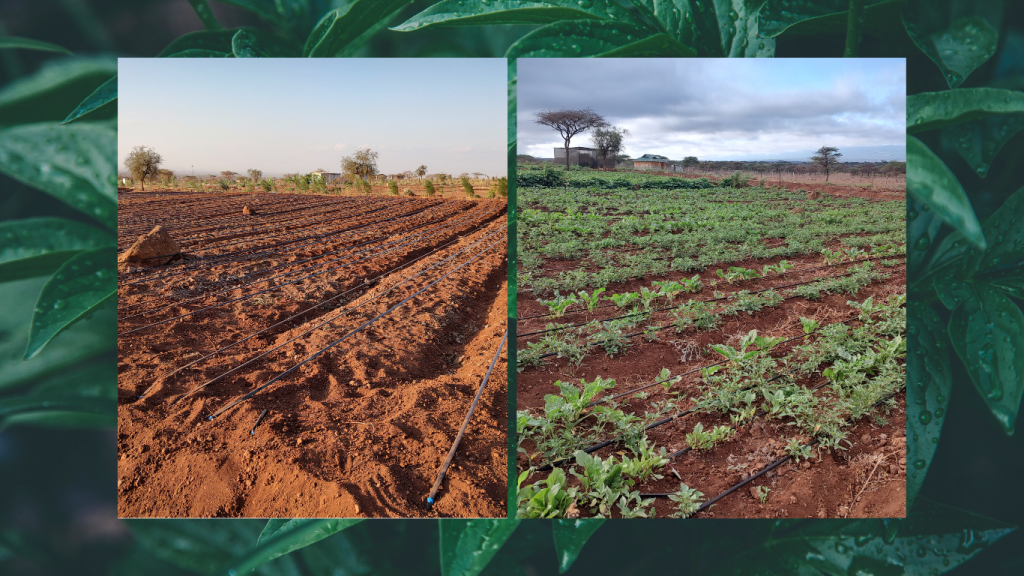
In 2022, we started Ambokili Farm on a dust-laden, semi-arid landscape in Kimana town. The land was damaged, with gullies as deep as 2 meters and sheet erosion that had stripped the soil bare.
There was deep gulley erosion ranging from 1-2m deep and severe sheet erosion. To mitigate and reverse the effects of soil erosion, we planted Dracaena Stuckyi, a naturally growing plant, to block the agents of erosion especially wind and water. We then created contour terraces to reduce the strength and force of the water. Fanya Juu and Fanya Chini channel terracing enabled us to divert the water and use it for other purposed.
For ground cover, we opted for Vetiver grass since it can have roots more than 2M deep. This grass really enables the soil to remain intact. Additionally, the ground cover would reduce flow velocity, increases soil stability, and add aesthetic value. Vetiver grass also has other beneficial uses e.g. it can be used to make oil, knit bags etc. The grass took on well and we’d later refer to it as our ‘miracle grass’ because of how quickly it grew and covered most of the Farm.
Companion planting has allowed us to build biodiversity in this area. We grew a variety of vegetables such as Black Nightshade (Managu), Cowpeas leaves (Kunde), Spinach, beetroot, and carrots. Now, more than 9 acres is covered with maize, onions, and other vegetables such as tomatoes, cabbage, watermelon, baby melon, pumpkin and cereals like green grams, beans, millet, and sorghum.
One year later, and we’ve transformed over 9 acres of that wasteland into green, fertile land. We’ve planted more than 500 trees, and a variety of fruit trees like dragon fruits, avocados, and passion fruit carefully chosen and nurtured.
To improve nutritional security, a fishpond has been built so that we have fish as one of our protein elements. The pond provides food and income for those working at the pond as well.
One of the biggest challenges we faced was water. The land is arid, we don’t have a borehole and buying water was expensive and unsustainable. Therefore, we came up with a plan to drill well. In such dry land, one can dig up to 200m without hitting groundwater. A borehole was way more expensive to drill, and we needed a quick, working solution especially due to the heavy water-consuming plants like trees. A well became our best option and we were fortunate to find water just after a few metres of digging.
Additionally, we built a 450,000-liter reservoir to collect and store water whenever we receive rain. It was placed at the highest point of the farm to leverage gravity, and this reduced our expenditure as we did not need to pump the water. However, considering the size of the Farm, we still need a borehole as this will not provide us with a sustainable source of water for our trees and crops.
More Than Just Farming: Building a Sustainable Ecosystem
We’re also working to restore the land and create a healthy ecosystem. Planting native trees and grasses has helped to prevent erosion and promote biodiversity. The fishpond is not just for food and income but also to attract beneficial insects and birds that would help pollinate our crops and control pests.
We were committed to organic farming right from the start. The land had been ravaged by years of conventional farming and chemical use, leaving it infertile and depleted. We’ve used organic farming practices e.g. biological pest control to reverse the damage done by previous tenants who used harmful chemicals. Natural methods like compost and crop rotation have restored the soil’s health and brought life back to the land.
Our work at Ambokili Farm has had a significant impact on the local community. The community members say our produce are the only ones that do not give them stomach issues. We’ve created jobs, provided food and nutritional security, and helped to improve the environment. We’re also sharing our knowledge and expertise with other farmers in the area, helping them to adopt sustainable practices.
We wouldn’t be where we are today without the dedication and expertise of our team. From our skilled farmers to our resourceful engineers, everyone played a crucial role in our success. We also received invaluable support from our partners and the local community.
Today, over 9 acres of once barren land are teeming with life. Our trees are thriving, our crops are bountiful, and the fishpond is abuzz with activity. We’re not just growing food; we’re cultivating a sustainable future for ourselves and the generations to come. We’re excited about the future of Ambokili Farm. We have big plans to continue expanding our farm, build a research centre, build botanical gardens, acquire a biodigester and build an animal orphanage. We’re also committed to sharing our story and inspiring others to make a difference in their own communities.
We invite you to follow us on our journey as we continue to transform Ambokili Farm. You can learn more about our work on our website or social media platforms. You can also support our efforts by donating or volunteering your time.
Together, we can make a difference. Let’s turn even the most barren wastelands into green, fertile oases, one seed at a time.